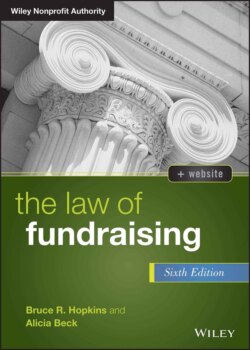Читать книгу The Law of Fundraising - Bruce R. Hopkins - Страница 89
§ 3.20 MISCELLANEOUS PROVISIONS
ОглавлениеIn several states, a solicitor is required to place contributions in an account at a financial institution; in most of these states, the account must be solely in the name of the charitable organizations involved.
In some states, charitable organizations and/or professional solicitors are required to timely send confirmations or receipts of contributions to the donors. The law may provide an opportunity for a donor to subsequently cancel a contribution. In a few states, the solicitation of contributions in the state is deemed to be doing business in the state.
The laws in some states mandate a public education program as to charitable giving and fundraising abuses.
In most states, the regulatory officials are expressly granted the authority to promulgate rules and regulations to accompany the particular state's charitable solicitation act.
In some states, the law provides that county or municipal units of government may adopt other and/or more stringent requirements regarding the solicitation of charitable contributions and, expressly or impliedly, that these requirements will not be preempted by the state law. This rule is sometimes referred to as the municipal option.
In a few states, a provision makes it clear that the charitable solicitation law may not be construed to restrict the exercise of authority generally accorded to the state's attorney general.
Occasionally, the regulators must make an annual report to the governor and the legislature on the activities with respect to charitable solicitations in the state. In a few states, the regulators must maintain a registry of charitable organizations or professional solicitors.
The law may authorize a commission or council to serve, in an advisory capacity and/or otherwise, as part of the administration of the state's charitable solicitation act.
In a few states, there are limitations as to use of the telephone for charitable solicitation purposes, particularly where the callers are compensated. One jurisdiction flatly prohibits the practice.75 Others state the hours during which the calls may be made, either by a charitable organization, a professional fundraiser, or a professional solicitor. The law may prohibit a gift solicitation by telephone where there is harassment, intimidation, or torment.
